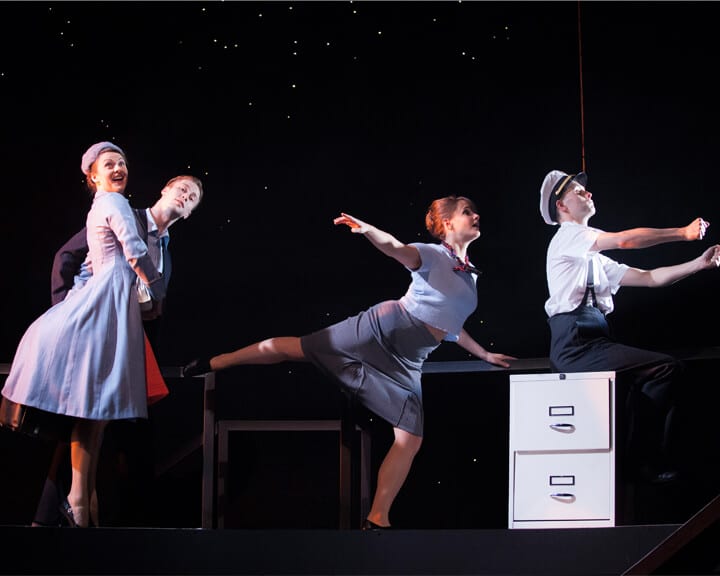Laurence Marks and Maurice Gran have stepped back in time yet again with their latest play Love Me Do. Set at the time of the Cuban Missile Crisis in September 1963 the drama – which began as a BBC radio play – is centred on the lives of Dorothy (Sara Topham), a Kansas housewife visiting England for her friend’s wedding, and Shack (Robert Curtis), a former US Colonel, living in London and working for the American Embassy.
It can be difficult for younger people to perceive the alarm that was felt at the time of the crisis. My parents and grandparents had lived through one (perhaps two) major world conflicts and the dread of a bomb that had the ability to annihilate civilisation was passed down to the younger generation of baby boomers. The world was quite literally on a knife edge as the rhetoric and threats were exchanged between Presidents Kennedy and Khrushchev.
Dorothy and Shack are both thousands of miles from home as the perceived Armageddon approaches. There are no flights out of London and making transatlantic phone calls is an impossibility: fifty years ago there were no mobile phones and long distance calls had to be pre-booked through an operator. Although she desperately wants to return to her husband and children, Dorothy finds herself increasingly drawn to Shack, a gentleman who offers her his bed, but refuses to take advantage of her. Their shared feelings grow with the inevitable conclusion taken by those who believe they may never wake to see tomorrow, except that the dawn brings a world that has stepped back from the brink.
Designer Ruari Murchison and Lighting Designer David Howe have constructed a single multi-level set with movable props that are adapted to depict homes, hotels, airports, offices and shops. Hugo Bolton, Peter Clements and Rosie Holden play all the other supporting roles, including a suitably bow-tied BBC Radio Newsreader and a pair of statue-like male shop window mannequins. In addition the three of them perform a delicious enactment of a toy train set in Hamleys, chuffing and whoo-whooing round the stage.
Dorothy and Shack’s growing relationship is frequently referenced with film quotations and connections, including the obvious one pointing out that Dorothy is from Kansas, minus Toto. She belies the idea of the insular American and proves herself to be well informed with her questioning of politics and Communism, whilst he is the single man, trying to do the honest thing by a married woman, which includes refusing her sexual advances when she is hilariously high on the side effects of the Quaaludes she has swallowed to take the edge off her worries. The production is also underpinned with music, especially jazz, although the song that is the play’s title is never heard. The connection is that the Beatles’ first record was released during the same week in September 1963.

